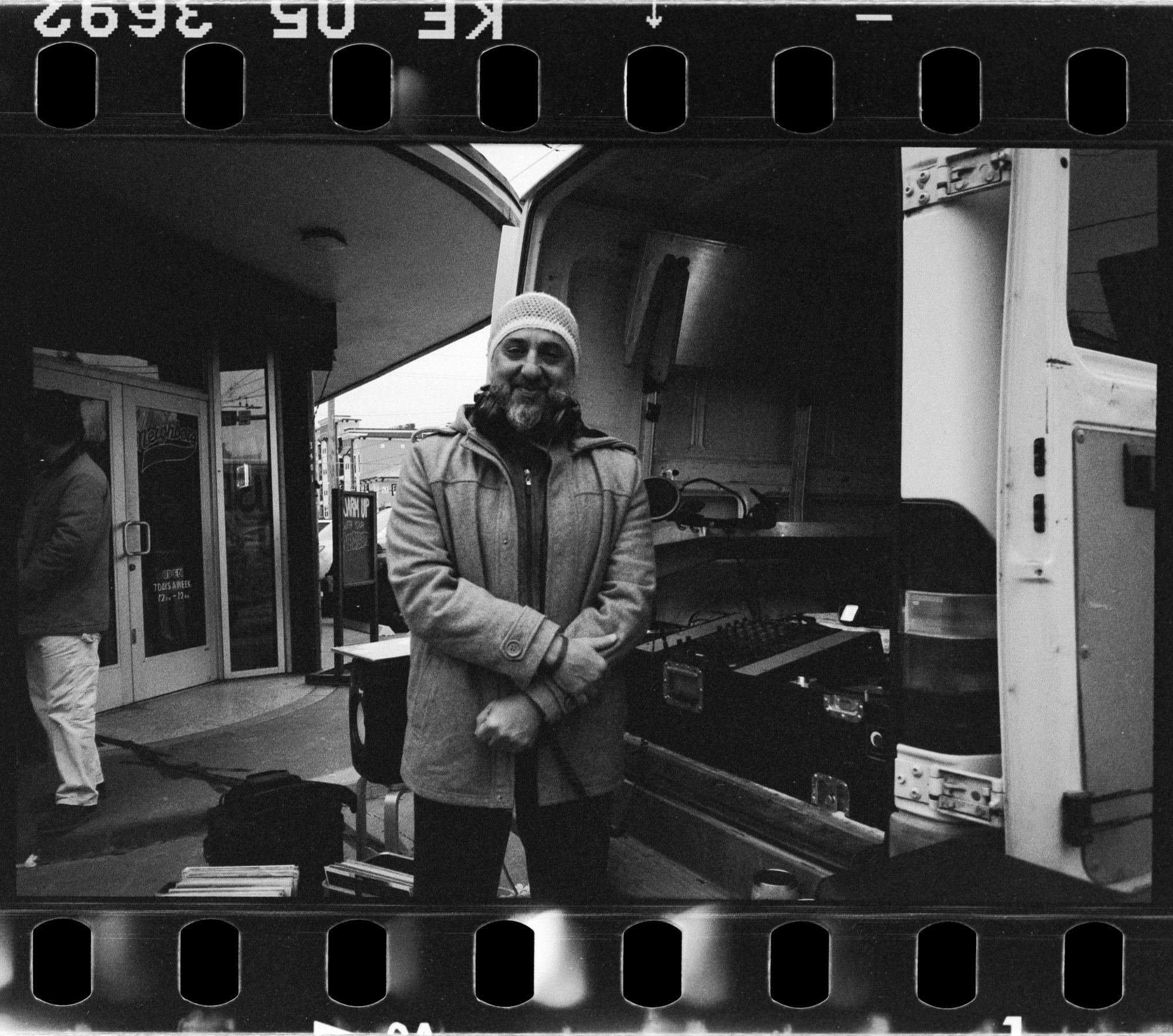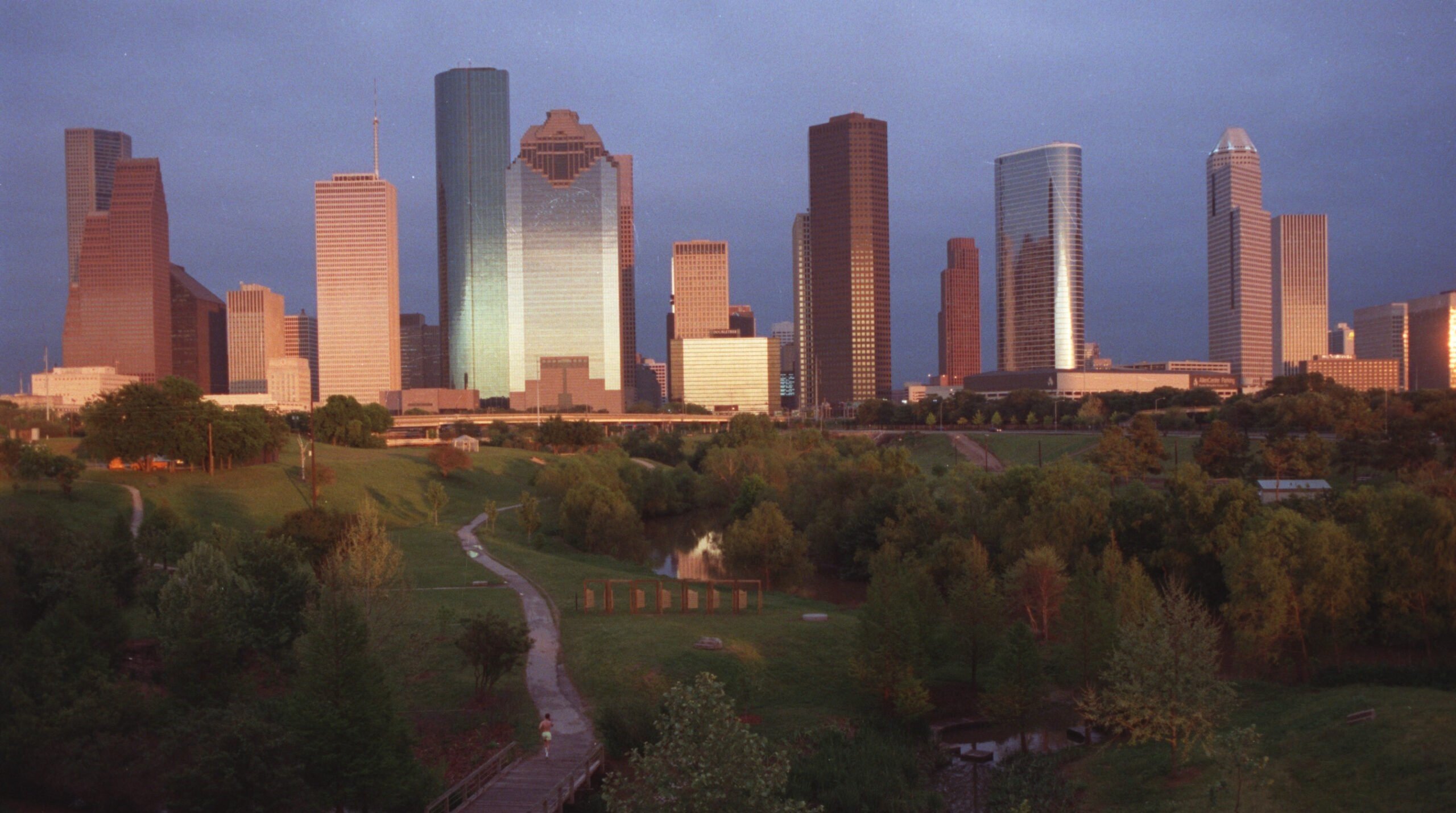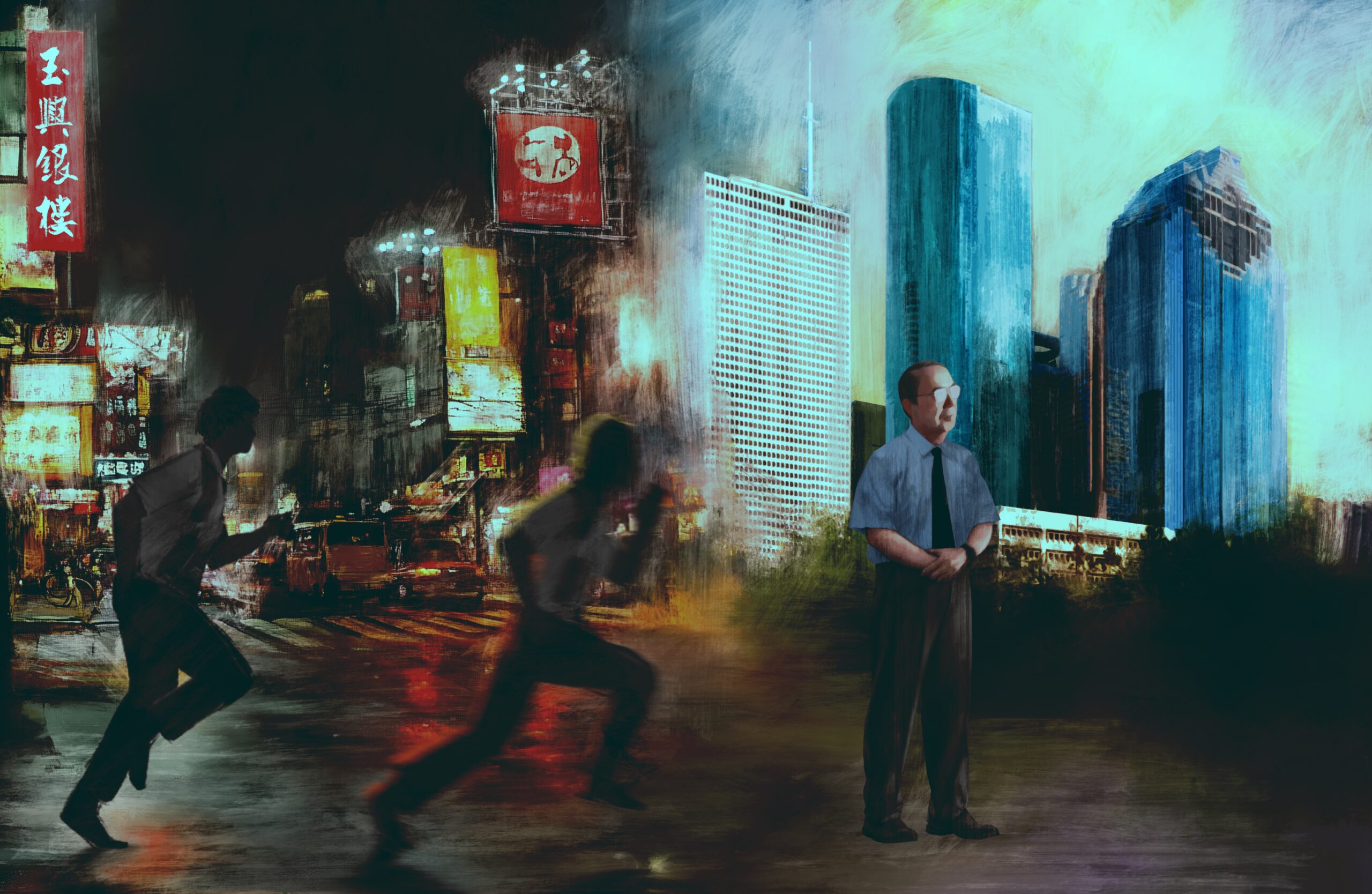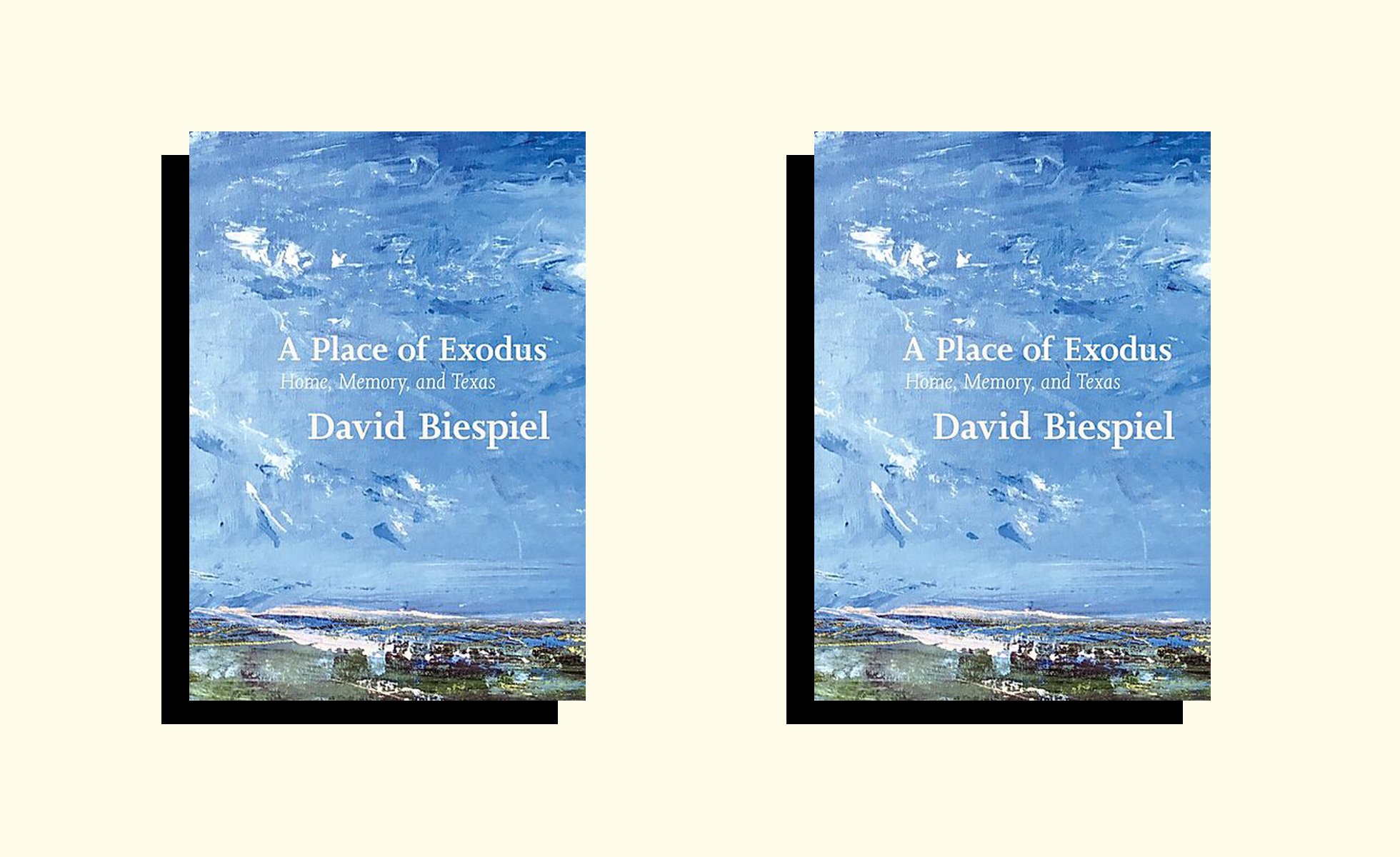
Remembering a Jewish Upbringing in Meyerland, Texas
An excerpt from David Biespiel’s memoir A Place of Exodus.
In his new book, A Place of Exodus: Home, Memory, and Texas, David Biespiel remembers growing up in Meyerland, Houston’s historically Jewish neighborhood; leaving Texas after a public quarrel with his rabbi; and returning years later. A Place of Exodus is excerpted here. Buy the book on Bookshop, or join Biespiel on October 8 for conversation with “Between the Books” podcast host David Naimon, a virtual event hosted by Powell’s City of Books. This excerpt has been lightly edited.
I never told anyone this, but for a time I thought I would be a rabbi when I grew up. Not that I thought about it every day, but especially during my teenage years, by which time it was already too late.
Not what you’d think of when you imagine the mystique of a deep-down Texas childhood, with the cattle and pump jacks and muggy vastness, pine pollen and red dirt, farm-to-market roads stitching together lonesome towns that get hotter after the sun sets, evangelical radio, Friday night football, Lone Star flags flying over all the gas stations, eighty thousand miles of freeways and billboards, boots and belts and 10-gallon hats.
But I don’t know how else to describe it. Chanting Hebrew prayers inside the magnetism of Texas lore was my open range of obligation, my 254 counties of faith, my Book of Third and Long. Dots and dashes slashing across the siddur, the Jewish prayer book, were my hominy and grits, my leaves of trees budding in February, my hot bowls of chili, my Davy Crockett at the Alamo. The silky ink of Genesis and Exodus stained the flat drawl in my mouth, more gentility than twang, so that I felt paltry and sensuous, the verses cutting into the violent weather of my imagination with their multitudes—curved tropes skittering across the pages like a two-step, a deliberate memento and admonition of how human beings behave.
Since my first religious experiences were passed through blood, nothing went amiss. Even in the 1970s, in Houston, we still weren’t so distant from the lesson of Auschwitz, that no one cared that Jews were being murdered. Nor were we so distant from my grandfather’s shtetl childhood, in Ukraine, before the First World War, with stories of buying a cow and taking it to the shochet, the butcher trained under Jewish law. Everybody kept kosher in Cherniostrov. No such thing not keeping kosher. On Fridays when it was the time to bench licht—to bless the lights—there used to be a man who would go on the streets and holler, Time to bench licht! Several thousand families gathered in their small homes and lit the sabbath candles to brighten the way for the Messiah to travel on a glimmering current.
I suppose, when I thought of becoming a rabbi, what I wanted was to give myself a life of enduring myths, and I must have thought to live as a person of faith would purify my principles.
With the black prayer book open in my hands, in another era, in another part of the world, when I was a boy in Texas, I too was swept away by a strong current without knowing where it was taking me. Each word quickening like a dancer who refuses to slip away unnoticed, a folk dance performed over and over without rest in the face of all obstacles.
None of that required getting used to. I was an heir to it. Hebrew was a home that had been bequeathed. It came as naturally to my body as fingers and toes. It would have been weird not to be Jewish where I lived in Texas, or to hear someone announce he was renouncing Judaism, quitting Judaism, with no intention to practice Judaism in the future.
Yet with all this, there was something frightening about it, of disaster to come, like a portent of thunder clouds over the lowlands.
I suppose, when I thought of becoming a rabbi, what I wanted was to give myself a life of enduring myths, and I must have thought to live as a person of faith would purify my principles. I became a writer instead. No great leap.
***
Because I grew up in Meyerland, the historic Jewish section of Houston, and because I left at the age of 18 after a public quarrel with one of the city’s leading rabbis, Jack Segal, who’d been my rabbi since I was 4 years old, and because I have had almost no contact for decades with most anyone down there, because I left that community and never returned, never called, not so much as mailed a postcard, I often have a bout of trepidation about going, well, home. Since 1982, I’ve been back to Meyerland but two or three times. It’s always been in passing, and always accompanied by a feeling that carries me right to the edge of dread, fatigue, hostility, and dissolution.
Still, I love being an expatriate Texan. Texas holds the landscape, if not the mise-en-scène, of my true spirit. I miss the bright, massive skies, the swarming parade of clouds chasing the wind for miles and miles. I see nothing wrong with barbecue ribs for breakfast. My go-to cookbook is the Homesick Texan Cookbook, with recipes for pickled okra and chicken-fried steak and buttermilk pie. My oldest brother lives in Texas, on a ranch. My 90 year old father lives in Texas.
And yet, the few times I have passed through, passed through Meyerland that is, I find myself, with no effort at all, able to see into my old homeland something like a sequence of moments, the map of a private history, from which I quickly and, to my mind, dangerously retrieve my ex-self, with all the old disaffection, fear, knowledge of death, scent of beauty, reflections on difficult thoughts, wonder against righteousness, and curiosity against survival, until, finally, at last, I find myself settled into a great sadness.
***
I often get the question when I tell people I’m from Texas, “There are Jews in Texas?” Yes. A lot. The storied Weequahic section of Newark in Phillip Roth’s novels has got nothing on Houston’s Meyerland, which sits on a flood plain along Brays Bayou southwest of downtown, bound geographically by two historic synagogues. The first is Beth Yeshurun, the largest conservative congregation in North America, where some twenty five hundred families belong, including mine when we lived on Loch Lomond, an integrated block of Jews and Christians, after my father, mother, two older brothers, and I moved from Tulsa in 1968, the year I turned 4, so my father could run a small garbage company on Wilmington Street owned by my grandfather on my mother’s side. The wood-paneled sanctuary at Beth Yeshurun seats a thousand congregants. There’s a nursery school and Day School and classrooms for Torah study, all of which I attended. A chapel for morning and evening minyan, and another for weekly services. A Jewish museum. Hotel-sized kosher kitchen.
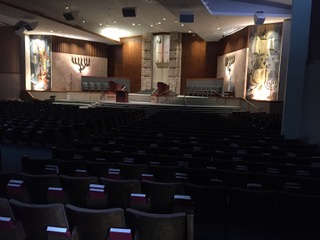
Three miles west along the bayou is the reform Temple Beth Israel, the oldest congregation in Texas history, where another two thousand families belong. Inside or adjacent to the neighborhood are Jewish high schools, smaller reform temples and conservative synagogues, as well as Orthodox and Sephardic congregations. Across the bayou from Beth Israel, taking up an entire block with its swimming pools and gymnasiums and health clubs, arts rooms and theater, dance studios and auditoriums, is the white colonnade Jewish Community Center that appears always to be cooling, like a birthday cake, in the smeared heat.
More than most neighborhoods in Houston, recently Meyerland has been nearly swept away by three catastrophic floods. Ten inches of intense rainfall over 10 hours fell during Memorial Day weekend in 2015 and flooded some seven hundred homes. Three people drowned, including an older married couple—the wife’s body was discovered next morning in Brays Bayou, but the husbands’ drifted all the way to the Port of Houston and was not discovered for nearly two days. During the Tax Day Flood of April 2016, some eight inches of rain flooded Meyerland. Another thousand homes were damaged.
Then, in the summer of 2017, Hurricane Harvey crashed the Texas coastline, moved inland, then stalled, causing it to produce more than 50 inches of rain over several days in one of the highest populated areas of the U.S. Gulf Coast, the worst flood in Texas history. Major highways around Houston were shut down for days. Floodwaters overflowed bridges. People set up tents on rooftops, while others motored dinghies as rescue boats through the flooded interstates to help victims evacuate their cars or homes. Makeshift aid stations sprang up in parking lots outside strip malls. Household debris was piled head-high on streets for months. Hundreds of thousands of homes were left uninhabitable. The hurricane claimed over a hundred lives. So many families, I’m told, have had to move out of their ruined homes in Meyerland that at nighttime, with electricity cut off, street after street, from Willowbend to Beechnut, is pitch dark, as if Meyerland is the latest Jewish shtetl to be wiped off the map.
***
My wife, Wendy, says, Where are you from? is her favorite of the icebreaker questions because the range of options, such as a neighborhood, a town, a continent, is gentle. Gentler than the answers to that other icebreaker, the rude insertion, What do you do?
Wendy’s answer is, I live in Portland, but I’m from Springfield, Oregon, in Lane County. Unincorporated Lane Country, I chime in. To which she retorts, Yes, well, you’re a Texan who’s lived in a dozen states and inhabited the same two liberal zip codes in Southeast Portland for more than 20 years.
She’s hurt that her daughters, Ruby and Violet, when asked where they’re from, say, Portland—where they were born—and not Springfield, where Wendy’s mother, father, sister, niece, nephew, aunts, uncles, and cousins have lived. Portland is also the answer my son, Lucas, gives. He was 2 years old when we moved here, but he was born in rural Maryland, outside Washington, D.C., when I lived there with his mother, my first wife, on a small ranch. Lucas’s mother is Canadian. Once, about 6 years old, during breakfast in the clapboard house we lived in near Hawthorne Boulevard in Portland, Lucas announced over a plate of scrambled eggs and fried potatoes, I get it, I’m half Canadian, half Oregonian, half Jewish, and half Texan.
For many people, the question about where are you from begins with how people define home. One definition of home is, it’s a place you think you can always go back to because it’s as much a pushpin location on a map as it is embedded in your consciousness.
The decision to leave home—when it is a decision, as it was for me—perhaps indicates a breach between self and other, a fissure, a crevice. Where we are from is an opening inside us. No matter what, consciously or subconsciously, we are clutching some shard of that place. Even if by place we mean, displaced. As James Baldwin says: “You are always the receptacle of what has gone before you, whether or not you know it and whether or not you can reach it.”
Still, our understanding of what that remnant means might always be inadequate. We may never integrate our disquiet with our living selves.
Read more from the Observer:
-
The Anti-Indigenous Handbook: Across the globe, anti-Indigenous organizations and sympathizers work to undermine the collective rights of Indigenous peoples. This collection of reports reveals some of the most common attacks Indigenous communities face today.
-
State Officials Tried to Cut Women’s Health Care During a Pandemic. It’s a Clear Reflection of Priorities: The state health agency continues to propose cutting services for families while leaving fully intact a program that funds anti-abortion crisis pregnancy centers.
-
Erika Andiola Says Dreamers Know How to Push Biden: “All we can do is pick our opponent,” says Andiola, the chief advocacy officer for the San Antonio-based immigrant rights group RAICES.
